
Bradley Manning supporter in Gitmo suit and cage
On Tuesday 24 April 2012, about 13 people (including me) rallied in Dallas, Texas, in support of Private First Class Bradley Manning as similar rallies took place worldwide on the dates of his Article 39 pre-trial hearing. Manning, a 24-year-old U.S. Army intelligence analyst and Nobel Peace Prize nominee, is, after nine months of pre-trial humiliations and solitary confinement, currently undergoing court martial for allegedly leaking the following material to WikiLeaks:
-
The Collateral Murder video, which shows a U.S. helicopter firing on several Iraqis, killing, among others, two Reuters journalists and a van driver who tried to rescue one of the pair.
-
The classified reports of the Afghan War Diary and the Iraq War Logs, which detail several years of military action.
-
Cablegate, over a quarter-million secret State Department cables, which among other revelations show that U.S. Sens. John McCain, Joe Lieberman, and others promised Libyan dictator Moammar Gadhafi military hardware; that Hillary Clinton instructed diplomats to swipe biometric data, passwords, and credit card numbers from foreign dignitaries at the United Nations; and that Canada covertly promised aid for the U.S.-led invasion of Iraq.
-
The Gitmo Files, memoranda describing prisoners held by the U.S. Joint Task Force at Guantanamo.
Manning is charged with multiple violations of the Uniform Code of Military Justice, including aiding the enemy, a capital offense, though prosecutors have said they will not seek his execution. For two years and counting, no one has been demonstrably harmed by the leaks. Manning’s nine months of extreme pre-trial punishment, the Bradley Manning support website points out,
sparked a probe by the United Nations special rapporteur on torture, Juan Mendez. Mr. Mendez stated that he has been “frustrated by the prevarication of the US government with regard to my attempts to visit Mr. Manning.” After having his requests to visit Bradley repeatedly blocked, and after completing a fourteen month investigation, Mr. Mendez issued a statement saying that PFC Bradley Manning’s treatment has been “cruel and inhuman.”
The Dallas rally started at 4:30pm. I took the photos on this page (click ’em for larger versions), and the videos of the rally embedded here are from bucky3phase’s YouTube channel, which has more, similar clips from the rally.
(In the above video, the guy in the black WikiLeaks T-shirt messing with his phone is me. I was spreading information about the rally on Twitter.)
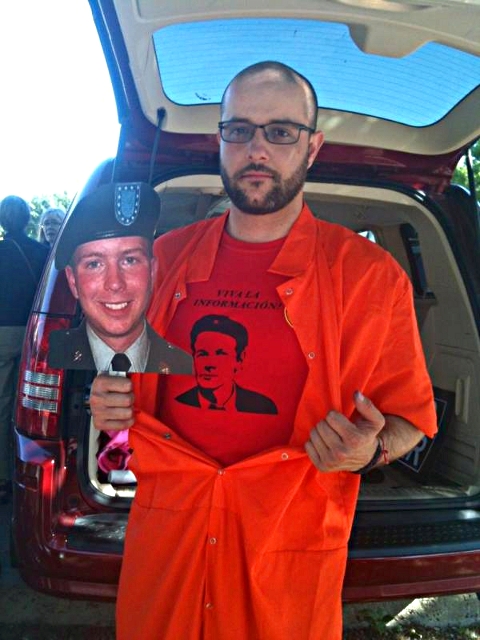
Bradley Manning supporter in Gitmo suit w/ Assange Viva La Información T-shirt under it (iPhone pic from my tweet)
As I wrote for Salon, Geoffrey Robertson, one of Assange’s lawyers, says the nine months of humiliation and solitary confinement imposed on Manning were an attempt to make him “falsely confess to being groomed by Assange.” Right now, in northern Virginia, the U.S. is pursuing a grand jury investigation against WikiLeaks and its founder and editor-in-chief Julian Assange. A plea bargain from Manning might mean information or “information” prosecutors can use against WikiLeaks. Though WikiLeaks works with many big media outlets worldwide, the U.S. has prioritized WikiLeaks as an enemy (in addition to pursuing whistleblowers and journalists not connected with WikiLeaks), probably in large part because the Internet and the organization’s design means many more leaks against powerful wrongdoers than otherwise. Prosecution of WikiLeaks is a gigantic threat to the freedom of the press, and it isn’t helping anything that the New York Times, which has worked closely with WikiLeaks, is siding more with the U.S. government than with Assange.
We had a mild incident with two police officers and a plainclothes guy with a gun (see video above) — he is, I’m told, a Dallas Police Department detective. I didn’t hear exactly what happened, but apparently we were in violation of Dallas City Code 28-158.1, which is titled PROHIBITING THE CARRYING OF SIGNS ON, OVER, OR NEAR FREEWAYS and says among other things:
In this section, SIGN means any device, flag, light, figure, picture, letter, word, message, symbol, plaque, poster, or other thing that is designed, used, or intended to advertise or inform.
(b) A person commits an offense if he carries or otherwise displays a sign on, over, or within 75 feet of the roadway of any of the following streets or highways in a manner intended to attract the attention of vehicle occupants on those streets or highways
The ordinance lists the highway we were over, Central Expressway. Essentially they wanted us to scoot our free speech activity 75 feet away from the Central Expressway access roads. What the detective reads out — about access roads — when he’s apparently quoting the ordinance is different than the ordinance as written online (linked above), but maybe the detective is accessing an updated version; the Dallas City Hall website says the online version may not be up to date. (As a Fort Worth resident, it might be hard for me to get a copy of the up-to-date, printed Dallas City Code; does anyone have it?) Anyway, as written online, the ordinance doesn’t specify access roads, and I think the overpass is more than 75 feet above the Central Expressway roadway proper. It is not clear to me that this (online version of the) ordinance is constitutional since generally the First Amendment guarantees the right to assembly and free speech activity on public sidewalks without permits, but I guess the overpass bridge might not be a “sidewalk” or something. Presumably there is relevant case law somewhere on this. (Please comment if you know more.)
Our conversation with the detective strikes me as particularly Southern somehow. I can’t articulate how I feel about all this very well. A city government has a legitimate interest in keeping people from dangerously distracting drivers, but that’s not what we were doing.
Attending this rally made me think quite a bit about the challenges and payoffs of getting people involved with political, humanitarian, or other activist causes. (Nonprofits talk about encouraging people to climb a “ladder of engagement.”) Jon Stewart’s humorous Daily Show makes people feel good while they learn more about politics and possibly contribute to causes that, while sometimes centered primarily around dialogue and tolerance, more or less sync with establishment progressive Democrat goals and methods. Plenty of evidence shows nothing kills a cause like negativity (and this applies in other areas as well, such as trying to win someone over while flirting). For example:
Dr Gloor has found that, in Western countries at least, non-violent protest movements begin to burn out when the upbeat tweets turn negative, with “not”, “never”, “lame”, “I hate”, “idiot” and so on becoming more frequent. Abundant complaints about idiots in the government or in an ideologically opposed group are a good signal of a movement’s decline. Complaints about idiots in one’s own movement or such infelicities as the theft of beer by a fellow demonstrator suggest the whole thing is almost over.
The video above captures one of the ralliers calling out “Wake up, people!” while banging on a cowbell, which he did quite a bit during the event. I’m supportive of this, as well as — clearly, from my Twitter feed — more in-your-face measures; hacktivists and Occupy activists, for example, having chosen intense tactics ranging from the legal to the civilly disobedient. (And many with effective, feel-good humor as well.) I’m glad when people raise a ruckus that makes people think, even when I don’t support their cause; democracy is supposed to be noisy, and like the Manning rallier was saying, people need to wake up. But is the crying out (or, to put it less positively, the yelling) effective? Does the audience hear it and wake up some as a result, or do they just get turned off? And how much does that matter, since part of the point of a rally is to reinforce the base and therapeutically vent?
That the crying out makes me cringe a bit reflects my intrinsic personality, my discomfort with intruding on others (see this on the INFP personality interaction style; this issue goes a long way toward explaining why creative writing suits me as opposed to a performance art form such as live music) — my internal cringing has no necessary connection with how in-your-face rally tactics empirically affect audiences. It’s also interesting that I don’t really cringe dealing with in-your-face tactics when they are expressed in sheer text or static imagery, but I do when they are live or on video. Attending one of these events in person is very different from watching it on Twitter. And the cringing isn’t just needless embarrassment at the intrusion on others; it’s also a reflection of my emotional upset about the injustice that the intrusion is protesting.
Much of Occupy Wall Street’s critique of contemporary America accurately concerns the middle class or suburban or establishment tendency to act politely — or, submissively — when working for political change. When Manning is being abused, or when banksters crash the economy and don’t go to jail since they run so much of the political process, and that destroys people’s lives, or when immoral wars kill innocents and governments cover up the causalty numbers, why be meek at a rally? (See this blog post about the progressive middle class wanting change without conflict, the Phil Ochs song “Love Me, I’m a Liberal,” or the Jello Biafra cover of the same song with updated lyrics.) Well, because it might not be effective (or maybe it is?). Plus, I think there are real and legitimate reasons for some people not to stick their necks out. If you have dependent kids, for example, you’re morally obliged to take care of them, and so you have an interest in security and safety; some people take their kids to protests (which is great and teaches them values), but that’s not feasible for everyone’s financial situations or personalities. But they might be able to support causes in other ways (emotionally supporting more active individuals, for example). I guess this all goes to show that it’s good for causes to have a variety of techniques and ways to participate.
Daniel Ellsberg, whose famous leak of the Pentagon Papers exposed U.S. government lies about the Vietnam War — and got him charged with espionage — has been very supportive of Manning, Assange, and WikiLeaks.
When Manning supporters brilliantly bought tickets to an Obama fundraiser and confronted him about the whistleblower’s prosecution, they recorded Obama on video saying Manning “broke the law”, which, as Obama is the Commander-in-Chief, could be unlawful command influence prejudicing Manning’s trial; people are to be presumed innocent until proven guilty, and as a law scholar, Obama knows better. (See also.) There is also Manning’s 700+ days of confinement in violation of the Sixth Amendment right to a speedy trial. Though his defense’s efforts to have charges dropped have failed so far, some miracle could still happen. After all, Ellsberg’s charges were dropped due to crimes against him by the Nixon Administration:
After many months of legal maneuvers–and illegal government maneuvers, the trial of Ellsberg and Russo finally opened in January 1973. This was the same month that the United States officially ended its war in Vietnam (a fact that escapes Wells’ notice). By this time, the Plumbers had burglarized the office of Ellsberg’s psychiatrist, tried to physically attack Ellsberg at a demonstration, developed plans to firebomb the Brookings Institute (because Nixon thought Ellsberg had hidden documents in its vault), and burglarized the Democratic national party office in the Watergate Hotel during the 1972 election campaign. During the trial, Nixon’s aide John Ehrlichman twice tried to bribe the presiding judge with the possibility of being chosen to head the FBI. These facts were brought into the trial, which was now taking place during the Watergate hearings. Finally, when evidence of previously undisclosed White House wiretaps of Ellsberg was introduced, the judge was forced to dismiss all charges.
Unlikely things happen.
The point is to do what you think is right, even if it’s uncomfortable or dangerous at times. I think that’s more important than measuring whether your action is the most effective one; but, as an artsy/emotional/creative person, that’s how I tend to relate to the world, and I’m glad there are more logical, practical-oriented people who focus on increasing efforts’ impact, since you don’t want wasted effort.
The leaks certainly weren’t wasted effort. To take just one example, when the U.S. wanted to keep its troops in Iraq past the 2011 deadline, the Iraqi government’s decision to say no was at least in part influenced by a WikiLeaks cable that showed Iraqi civilians, including children, were killed in a 2006 raid by American troops rather than in an airstrike as the U.S. military initially reported. (More.)
Quotes from an online chat attributed to Manning:
If you had free reign over classified networks… and you saw incredible things, awful things… things that belonged in the public domain, and not on some server stored in a dark room in Washington DC… what would you do?
God knows what happens now. Hopefully worldwide discussion, debates, and reforms… I want people to see the truth… because without information, you cannot make informed decisions as a public.
Bradley Manning Support Rally in Dallas April 24 by Douglas Lucas is licensed under a Creative Commons Attribution-NonCommercial-ShareAlike 3.0 Unported License. Based on a work at www.douglaslucas.com. Seeking permissions beyond the scope of this license? Email me: dal@douglaslucas.com.

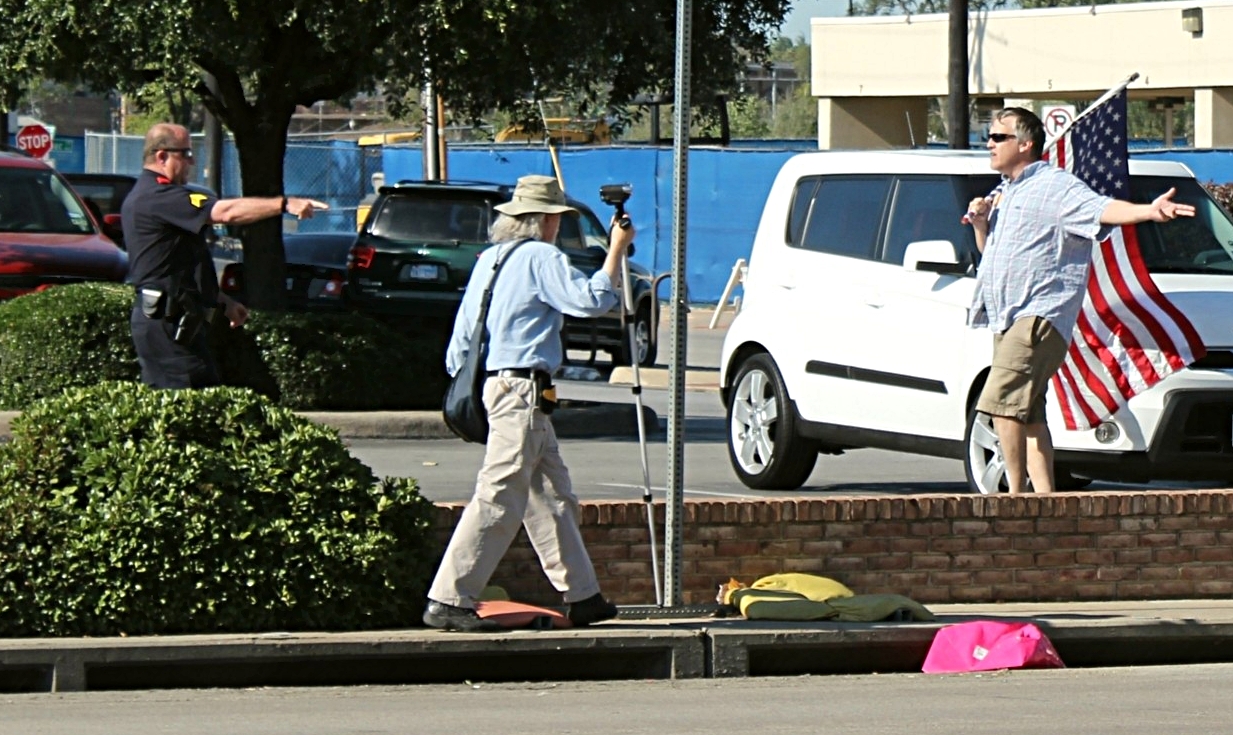
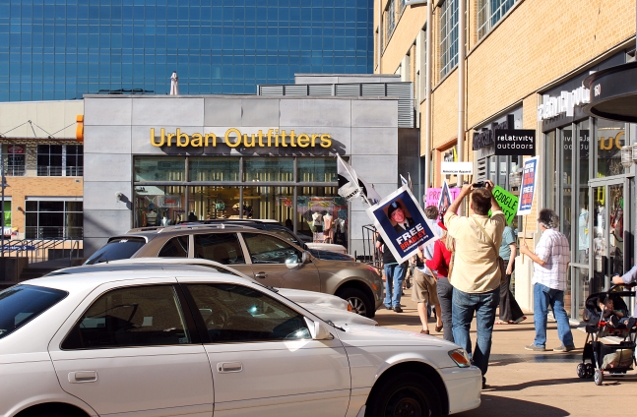
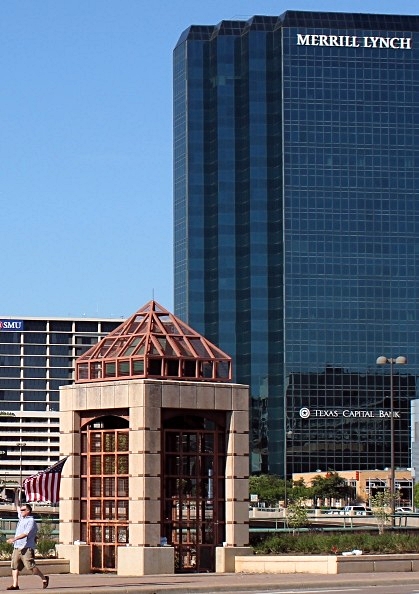

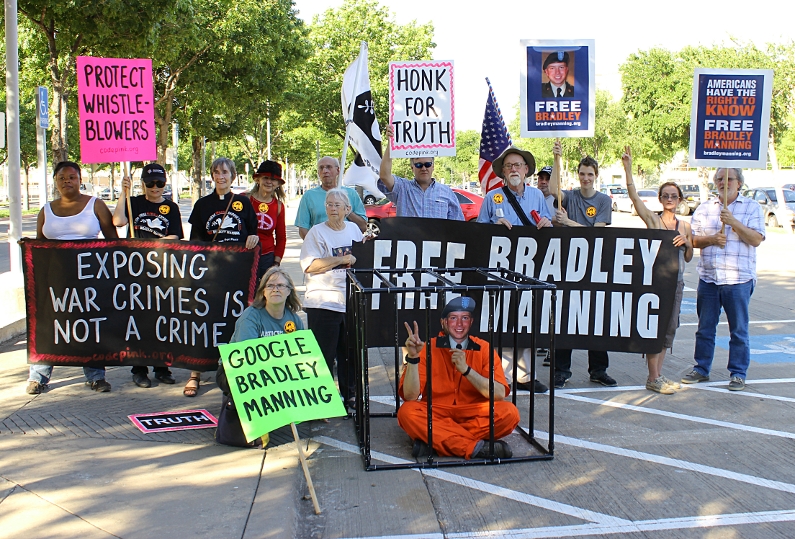


 Twitter:
Twitter:
Join the conversation